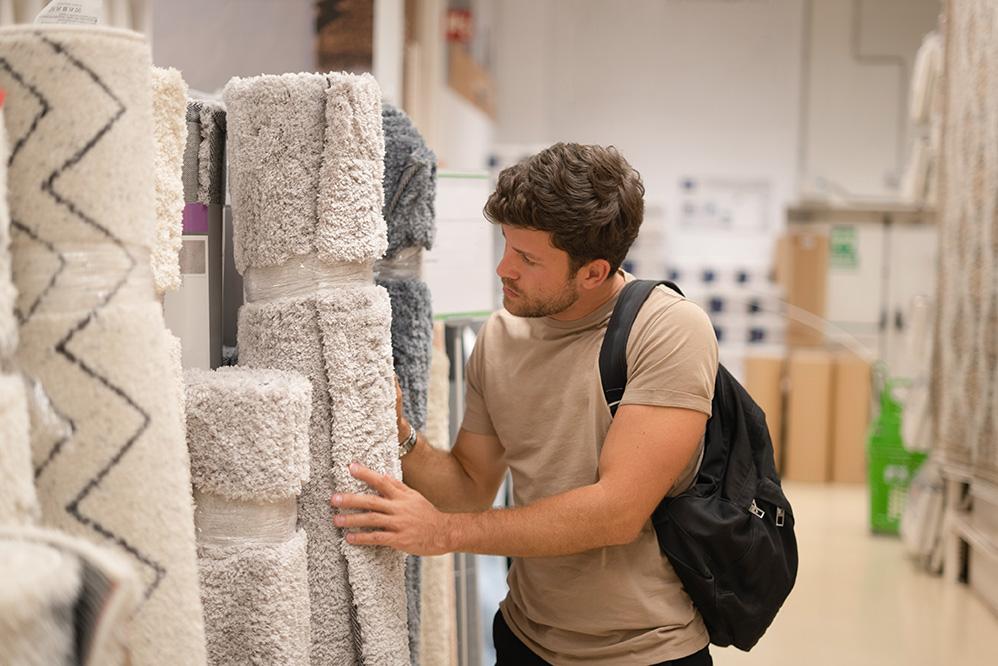Roll goods flooring is present in every facet of our lives. Area rugs, artificial turf, indoor/outdoor rugs, carpet remnants, and vinyl sheet flooring can be found everywhere, from homes to football fields. However, it had a much smaller start in Georgia’s tufted textile industry, dating back to the early 1900s.
Humble beginnings
Back then, Catherine Evans Whitener had just moved on from tufting patterns into bedspreads as gifts for her family and friends when she sold her first spread for $2.50 (now worth almost $90). She sold bedspreads to Northern department stores, and soon the tufting technique was applied to carpeting by companies across Northwest Georgia.
Not long after, the vinyl composite flooring experienced a similar boom when soldiers came home after the end of WWII. Upon their return, new houses needed flooring that was quick and affordable to install. Soon artificial turf was created to create much-needed physical fitness areas. Soon, the vinyl composite flooring market and tufted textile industry had grown to cover the entire world, while 90% of carpets created worldwide are still made within a 25-mile radius of Dalton, GA.
The challenge of transporting and storing roll goods flooring
With the roll goods flooring industry continuing to grow, producers must ensure a standard of care during transportation and storage.
For instance, area rugs and carpet remnants can lose their shape if improperly stored. During transportation, these cannot be folded as folding will cause creases, cracks, and other damage. Instead, the carpet should be rolled with the top side (known as the ‘pile’) facing out. Rolling rugs with the pile facing in can cause stretching or, in time, cracking. And if rolled inward, the consumer will not be able to see what they are purchasing, making it difficult to assess the look, quality, and price.
Similar challenges arise with sheet vinyl flooring, which comes in large rolls that make them more durable and stable than vinyl tiles and planks. It can be mass-produced in huge rolls and cut off in whatever size a customer needs. Not only is it quickly produced, but it’s also cheap. Due to its broad width, it can cover a floor with few or even no seams, making it one of the best flooring materials on the market for repelling water. Producing vinyl flooring in large rolls is much more attractive and beneficial for the manufacturer.
As a result, the benefits of roll goods flooring necessitated a reliable way for producers to store and transport them.
Enter Banding Stretch Film
Stretchtape’s Stretch Film comes in multiple varieties, but all endeavor to protect products like roll goods flooring.
Banding Stretch Film is an efficient, cost-effective method for bundling area rugs. The film is applied at the two ends and/or the middle. Then, the rolled goods are transferred to a packaging machine, where they receive additional plastic foil covering. Both processes combine to protect the rolled goods during transport.
A clear solution
When viewing rolled goods, anything that impedes the view of the fabric, material, color, and pattern can harm sales. By using clear Banding Film, customers can get a complete picture of an entire vinyl or carpet pattern when making a purchase decision. Additionally, it’s easy to incorporate branding and pricing sheets, sliding them under the wrap for clear visibility. The banding is also designed to stick to itself, not the product, meaning it will not damage or leave a sticky residue on the pile or flooring. By selecting one-sided cling (OSC), the rolled goods can slide on and over each other without getting caught or tearing, which is extremely helpful for loading and transporting.
Bigger Product, Bigger Solutions
More oversized items, such as turf or carpet remnant, are measured, rolled, and cut. A machinist might apply Hand Stretch Film to secure and protect the roll, which is ideal for smaller warehouses with limited numbers of pallets to wrap regularly. For warehouses that choose to cover an entire product on the cutter, the film is often applied in a barber pole style—where the film is held by an employee while the rolled good spins, wrapping the item automatically with minimal labor.
Alternatively, companies with more significant needs should invest in an orbital wrapper where rolled goods enter a circular device, and the film wraps around them automatically and quickly. These stretch wrappers are ideal for long loads such as flooring, carpet, paper rolls, building materials, and more. They can wrap multiple items to ensure secure load containment, save on the amount of film used, and cut labor costs.
Click here to learn more about Stretchtape’s clear Banding Film, or get in touch with its many distributors across the US, including Dalton, GA:

